- Home
- Jayne Castle
Orchid
Orchid Read online
Contents
Prologue
Chapter 1
Chapter 2
Chapter 3
Chapter 4
Chapter 5
Chapter 6
Chapter 7
Chapter 8
Chapter 9
Chapter 10
Chapter 11
Chapter 12
Chapter 13
Chapter 14
Chapter 15
Chapter 16
Chapter 17
Chapter 18
Chapter 19
Chapter 20
Chapter 21
Chapter 22
Chapter 23
Orchid
Jayne Castle
Prologue
“Time is running out, Mr. Batt.” Rafe Stonebraker rose slowly from the massive, old-fashioned Later Expansion period chair. He was well aware of the effect his deliberate movement had on the man seated across from him.
Batt did not exactly flinch but the dapper little man definitely tensed. “Running out?”
“You’ve had three weeks to find me a wife. To date you have not produced a single possible match from your files. What seems to be the problem?”
“With all due respect, Mr. Stonebraker, you are not the easiest person to match.” Hobart Batt produced a professional, placating smile but there was a cautious expression in his eyes. “I warned you when you first registered that it might take some time to find a suitable candidate.”
“Synergistic Connections is supposed to be one of the most efficient matchmaking agencies in New Seattle.” Rafe stood looking down into the flames that flared in the cavernous fireplace, “You advertise that you have a success rate exceeding ninety percent. I expected better service from your firm, Mr. Batt.”
“Mr. Stonebraker, I assure you, we are doing our best. The thing is--”
“Yes?” Rafe turned his head to study Hobart ‘s earnest, anxious features. “Just what is the thing?”
Hobart shifted uneasily under the scrutiny. He tweaked his pink bow tie and adjusted the sleeves of his expertly tailored pale gray suit jacket. “To be blunt, Mr. Stonebraker, your, shall we say, rather unique situation is proving to be a bit more difficult than I had anticipated. We face a number of serious challenges.”
“I see. Are you saying that the resources of your matchmaking agency are not up to the task of finding me a wife?”
Hobart ‘s neat brows came together in an offended line above the rims of his round, gold-framed glasses. “I assure you that we are doing everything possible to find a good match. But the combination of your rather unusual psychic talent and your somewhat rigid personal requirements constitutes a considerable stumbling block.”
“When I registered you assured me that Synergistic Connections had established a reputation for its ability to match even unusual and rare high-class talents.” Unusual and rare were among the more polite descriptors for those such as himself whose paranormal abilities did not fit into the normal range, Rafe reflected. Exotic was the popular term. His jaw tightened. As if he was some sort of strange, wild beast from one of the still unexplored continents of St. Helens, he thought.
“Quite true, sir.”
“You saw my para-talent certification papers. I’m only a class six. Mid-range. I fail to see why I should be a problem for your firm.”
The certification papers were frauds, of course. He’d had them prepared by an expert forger several years ago. It had cost him a great deal of money, but money had not been a problem. It was never a problem for him.
Rafe made money the way a baker made cookies; easily, quickly, and efficiently. With his particular type of psychic talent it was no great trick to sit down in front of the computer, analyze the financial markets, and make decisions that produced quite predictable profits.
He had commissioned the false certification papers because he had no intention of allowing himself to be formally tested in a syn-psych lab. Psychic talents were common in the population. Almost everyone had some degree of paranormal ability. But most people fell well within the conventional, measurable spectrum, which ranged from one to ten.
The vast majority went to a lab to obtain an exact rating. Such testing was as routine as getting a driver’s license and took place at about the same time in life. The full degree of individual psychic talent did not mature until the late teens.
Paranormal abilities had appeared early on in the small population of colonists stranded on the planet St. Helens two hundred years ago. Psychic powers took two general forms. The majority of the population fell into the category called talents, meaning that they possessed a specific type of paranormal power that could be actively used. There were illusion-talents, hypno-talents, horticultural-talents, diagnostic-talents, tech-talents, etc.
The psychic energy that talents produced endowed them with a sixth sense. But unlike the other five senses, it could not be accessed except in brief, unpredictable, erratic bursts without the aid of a prism.
Prisms comprised the second, smaller category of people with psychic abilities. In them, paranormal energy took a different form. Prisms possessed the ability to focus the powers of a talent for an extended length of time. The economics of the situation being what they were, trained, high-class prisms often made good money selling their focus services to talents who wished to use their paranormal senses in a controlled, predictable manner for a lengthy period.
Neither talents nor prisms were distributed equally across the para-spectrum. The vast majority in both groups were bunched together in the lower and middle ranges. Very few people, talent or prism, possessed anything higher than a class-six level of psychic power.
By the time he was fifteen, Rafe had figured out that his talent was not only exotic, but much stronger than the average. His parents, both academics who held tenured professorships at the University of New Seattle, were disappointed that he had not inherited their gifts for teaching and research. Instead, he had been born with a full measure and then some of his grandfather’s rare para-sensitive strategic-awareness talent, commonly referred to as strat-talent.
To further complicate matters, he was obviously more than a class ten, although it was impossible to tell just how much more as the lab instruments could not measure energy levels higher than class ten.
Knowing the difficulties that lay ahead, his folks had urged him to conceal the full extent of his psychic abilities. Rafe had intuitively understood and complied. He did not need anyone to tell him that the strength of his paranormal powers placed him in the dark, unexplored regions that lay beyond the far end of the official psychic spectrum.
Like the handful of other people he knew who had a higher than normal degree of para-talent, his instinct was to keep the fact a closely guarded secret.
There was a name for people whose talent was so far off the charts that it could not be tested and quantified: psychic vampires.
The experts claimed that there was no such thing as a psychic vampire, of course. Given that true, off-the-chart talents seldom, if ever, volunteered for testing and current lab equipment could not measure anything higher than a class-ten talent, anyway, no one seriously argued the point. The current state of technology had created a classic scientific impasse. As far as the researchers were concerned, what could not be detected or measured did not exist.
But psychic vampires occupied a unique place in modern fiction and film. They were, after all, the stuff of legend. They fascinated and repelled. Rafe was well aware that books featuring handsome, sexy, super-talents who enslaved lovely, innocent prisms and forced said prisms to focus exclusively for them sold faster than iced coff-tea lattes in July.
The reality, however, was that even class-ten talents had a difficult time getting a date for Saturday night. People respe
cted high-end talents, some were even a bit awed by them. But almost everyone was a little wary of anyone who possessed an extremely high degree of para-talent, especially when that talent was a particularly rare type. Strong power, in any form, made intelligent people cautious.
High-class talents were often difficult to match with a high probability of success. Exotic high-class talents were even more of a problem for matchmakers. Any talent who was fool enough to admit to possessing both an exotic talent coupled with an off-the-scale amount of psychic power would very likely have no sex life at all, Rafe reflected.
His own love life had certainly been nothing to write home about lately and he had a set of phony certification papers to prove he was not a psychic vampire.
“I must be frank, sir.” Hobart fiddled with his elegant gold cuff links. “It’s not the level of your psychic abilities which is causing the problem. As you say, a class six in most types of talents is well within the normal range.”
“Then what, exactly, is the problem?”
“It’s the, um, specific nature of your paranormal abilities which is making things a trifle awkward.”
Rafe did not move. He gazed without speaking at Hobart until the syn-psych marriage counselor began to shift uneasily in his chair. A worried, vaguely desperate expression appeared in Hobart ‘s eyes. He glanced around as if expecting to see that someone-- or perhaps something-- else had entered the room.
Rafe knew that a hunted feeling had just come over Hobart . A primal kind of wariness and the beginnings of the sort of fearful awareness that made the hair stir on the nape of the neck.
Rafe sighed and doused the small flash of psychic energy. It was a stupid parlor trick, but it worked every time. He supposed he ought to be ashamed of himself for using it on the hapless Hobart .
He watched Hobart relax and smiled slightly.
“I know that there are not a lot of strat-talents around,” Rafe said. “But you assured me that you specialized in matching rare talents, Batt.”
“Unfortunately,” Hobart said earnestly, “It’s proving to be more of a hurdle than I had anticipated. Perhaps my recent successes with unusual talents made me somewhat overconfident. The problem is that most folks have only a vague notion of what a strat-talent is. I’m afraid that the general impression that most people have of talents such as yourself is not a reassuring one.”
“Are you saying that my para-profile is scaring off potential wives?”
“To be blunt, yes. I’m afraid that, although you are well within normal power ranges, you are considered something of an exotic, sir. I’m sorry to use the term, but there it is.”
Rafe gazed deeply into the fire. “There are worse terms for exotics who happen to be strat-talents.”
Hobart pursed his lips. “Yes, I know.”
Primitive was one of them, Rafe thought. Another popular epithet was throwback.
He did not need Hobart to spell out the details of his problem. Para-sensitive strategic-awareness talent was believed to be a para-heightened version of ancient human hunting instincts. Strat-talents were perceived to be natural hunters who could, in essence, think like the quarry.
Many people, experts included, privately considered strat-talents to be paranormal throwbacks to the evolutionary past. The psychic energy they possessed was more synergistically linked to the basic senses-- sight, smell, hearing, touch-- than were other forms of para-talent. At least that was the theory.
Primitive. Rafe had learned to hate that word.
There was a commonly held belief that, due to the unsophisticated nature of their paranormal power, strat-talents faced a limited job market. A lot of people assumed that they generally pursued criminal careers.
The misconception was true as far as it went. But in reality strong strat-talents also tended to do spectacularly well in business. Their unique abilities allowed them to assess markets and the competition the way their primitive, earthbound ancestors had once assessed herds of large woolly beasts. A little nudge here, a small, judicious push there and the first thing you know you’ve got a whole bunch of large woolly beasts floundering helplessly in a swamp or dashing headlong over a cliff. Easy prey.
Rafe knew that he and his kind had a reputation for being ruthless. He preferred to think of himself as simply single-minded.
Hobart regarded him with a direct, not unsympathetic gaze. “I’m afraid the process of finding a good match for you is going to take a lot longer than I originally estimated, Mr. Stonebraker.”
Rafe raised his brows. “Because most of the potential matches assume that I’ve got criminal inclinations?”
“I have done all of the appropriate background checks on you, sir. I will not hesitate to assure all potential candidates that you display no deviant or antisocial tendencies.”
“I appreciate that, Batt.”
Hobart appeared oblivious of the sarcasm. “The commonly held conviction that strat-talents frequently turn to crime is only one of the more unfortunate bits of conventional wisdom we must overcome. There is another popular myth which is equally difficult to dispel.” Rafe narrowed his eyes. “Five hells. Are you referring to that old notion about strat-talents being human lie detectors?”
“Well, yes, since you mention it.”
“That’s bat-snake shit and you know it.”
Hobart winced. “Yes, Mr. Stonebraker, I am aware of that. However--”
“It’s a complete misunderstanding of the nature of strat-talent. Probably left over from the days before the syn-psych experts had perfected their paranormal testing methods.”
“Yes, of course, sir. Nevertheless--”
“Every intelligent, educated person knows that there’s no such thing as a human lie-detector.” Rafe moved one hand in a gesture of disgust. “If there were, there would be no need for courts and criminal trials.”
Hobart coughed slightly. “You’d be surprised to learn what a strong grip some of the old notions have on the average man on the street.”
“I’m not looking to marry the average man on the street.”
“I understand, Mr. Stonebraker. But the bottom line is that we are dealing with a serious image problem here.”
He was beset with image problems these days, Rafe thought. After all these years of living life on his own terms, he suddenly had to worry about how others saw him. It was damned annoying.
“Even if it were true that strat-talents can detect lies,” he said patiently, “what is so off-putting about the idea? I assume that you would only match me with a reasonably honest wife.”
“Think about it, Mr. Stonebraker.” Hobart gave him a very level look. “Would you want to be married to someone whom you believed could detect even a tiny, polite, social lie? Would you want to live with a wife who would know you were not telling the truth when you said she looked like a film star in a bathing suit? The occasional, graceful half-truth is vital to the conduct of a civilized life.”
“Okay, okay, I see what you mean. But the fact is, I don’t possess any magical ability to know if someone is telling me the truth.”
Not exactly.
It was true that the same hunter’s intuition that served him well in business and in his hobby of private investigation sometimes gave him warning signals when others tried to mislead him. But that was a far cry from being able to detect lies, he assured himself. It was certainly not the kind of personality flaw that should keep a woman from marrying him.
Hobart peered at him. “More people than you would believe have an aversion to the notion of marriage to a strat-talent. They are afraid there might be some truth in the old shibboleths. But even those outmoded misconceptions, difficult as they are to correct, are not our only serious challenges, Mr. Stonebraker.”
Rafe folded his arms and propped one shoulder against the end of the bookcase. “You mean I’ve got other defects?”
“Well--”
“Tell me, Batt, have I got anything at all going for me in the marriage market?”
/> “Yes and no.”
“What in five hells is that supposed to mean?”
“One of our most difficult challenges is not the nature of your talent. It is the fact that you are a Stonebraker.”
Hell. He had been counting on his family name to overcome some of the complications posed by his talent. “I would have thought that was one of my few pluses.”
“It is and it isn’t.”
“Damn it, Batt--”
“What I mean is, of course your family name speaks for itself. Everyone in the tri-city-states is aware of Stonebraker Shipping. The Stonebraker name commands enormous respect in the highest social circles as well as in the business sphere. Your family has made great contributions to New Seattle.”
“Get to the point, Batt.”
“The point,” Hobart said carefully, “is that you have chosen not to involve yourself with Stonebraker Shipping. You have not followed in your grandfather’s footsteps. You did not even pursue a career in academia as your parents did. Instead, you have completely disassociated yourself from the source of the family fortune.”
“Ah.” Rafe closed his eyes in brief resignation. “I think I see the problem.”
Hobart ‘s mouth tightened with disapproval. “Matters would be greatly simplified if you had taken your place in the Stonebraker empire.”
Hobart was right, Rafe thought. As challenges went, this one was probably among the more difficult for a professional matchmaker. Any woman who could be persuaded to overcome her aversion to marrying a strat-talent who happened to be a Stonebraker would naturally expect to move in the same elite social circles as the rest of the clan. He had turned his back on those circles and the family fortune at the age of nineteen.

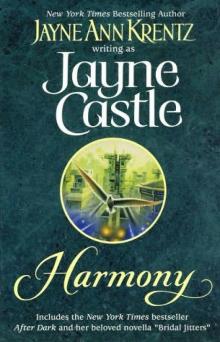 Bridal Jitters
Bridal Jitters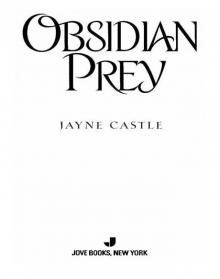 Obsidian Prey
Obsidian Prey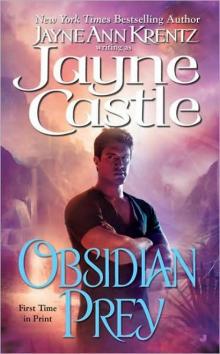 Jayne Castle - Obsidian Prey
Jayne Castle - Obsidian Prey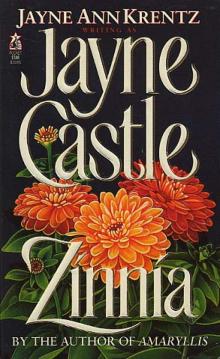 Zinnia
Zinnia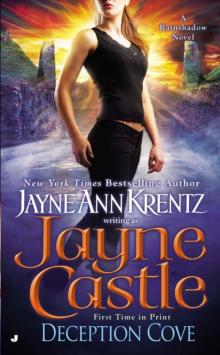 Deception Cove h-10
Deception Cove h-10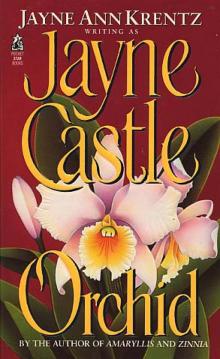 Orchid
Orchid Ghost Hunter gh-4
Ghost Hunter gh-4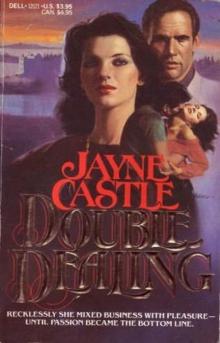 Double Dealing
Double Dealing Ghost Hunter
Ghost Hunter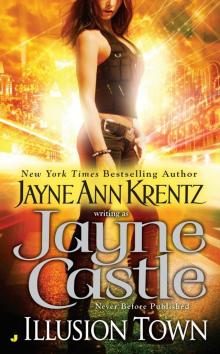 Illusion Town
Illusion Town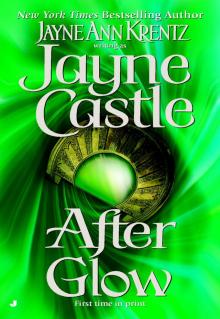 After Glow
After Glow After Glow gh-3
After Glow gh-3 RS01 The Lost Night
RS01 The Lost Night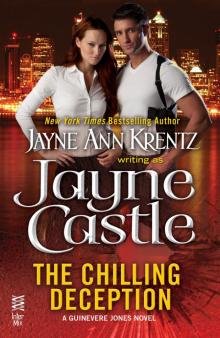 The Chilling Deception
The Chilling Deception Bridal Jitters gh-1
Bridal Jitters gh-1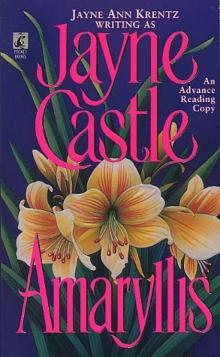 St Helens 01 Amaryllis
St Helens 01 Amaryllis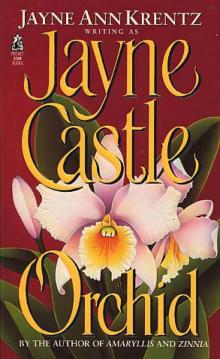 St Helens 03 Orchid
St Helens 03 Orchid After Dark gh-2
After Dark gh-2 Queen of Hearts
Queen of Hearts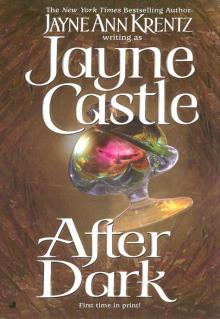 After Dark
After Dark Dark Light gh-6
Dark Light gh-6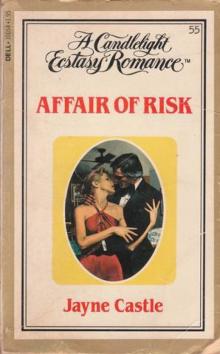 Affair Of Risk
Affair Of Risk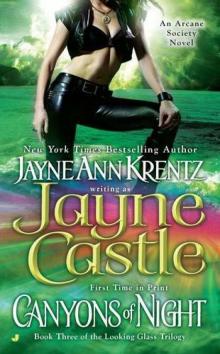 Canyons of Night lgt-3
Canyons of Night lgt-3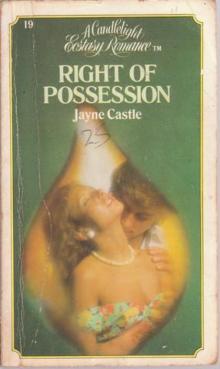 Right Of Possession
Right Of Possession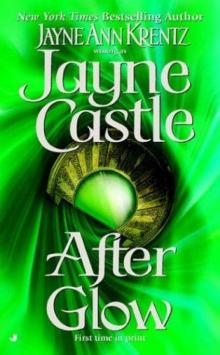 Harmony 03 After Glow
Harmony 03 After Glow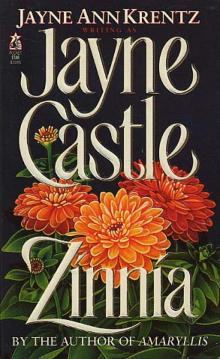 St Helens 02 Zinnia
St Helens 02 Zinnia Amaryllis
Amaryllis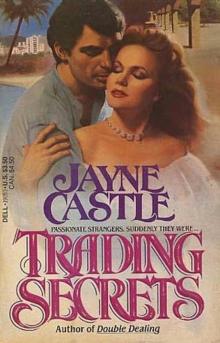 Trading Secrets
Trading Secrets Silver Master gh-5
Silver Master gh-5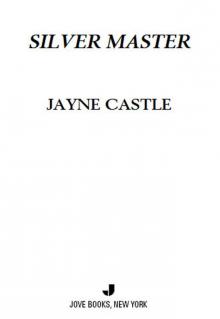 Silver Master
Silver Master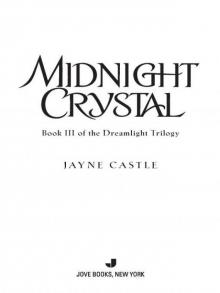 Midnight Crystal
Midnight Crystal The Desperate Game
The Desperate Game Siren's Call (A Rainshadow Novel)
Siren's Call (A Rainshadow Novel)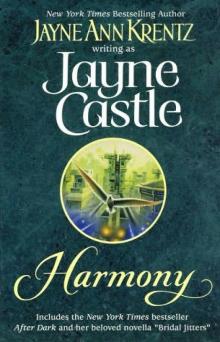 Harmony 02 Bridal Jitters
Harmony 02 Bridal Jitters Canyons of Night
Canyons of Night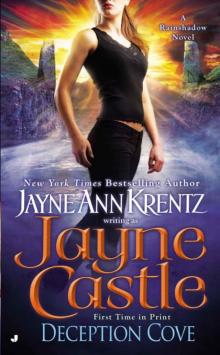 Deception Cove (A Rainshadow Novel)
Deception Cove (A Rainshadow Novel)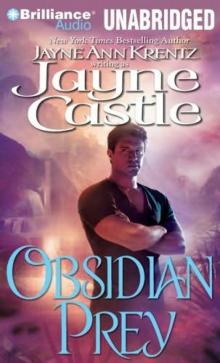 Obsidian Prey gh-7
Obsidian Prey gh-7